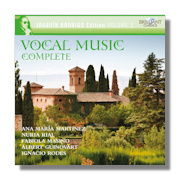
The Internet's Premier Classical Music Source
Related Links
- Rodrigo Reviews
- Latest Reviews
- More Reviews
-
By Composer
-
Collections
DVD & Blu-ray
Books
Concert Reviews
Articles/Interviews
Software
Audio
Search Amazon
Recommended Links
Site News
 CD Review
CD Review
Joaquín Rodrigo

Complete Vocal Music
- 4 madrigales amatorios
- Retablo de Navidad
- Villancicos
- 12 canciones españolas
- 4 canciones sefardíes
- Liricas castellanas
- Canciones de dos épocas
- 2 poemas de Juan Ramón Jiménez
- 2 canciones para cantar a los niños
- Con Antonio Machado
- Triptic de Mossèn Cinto
- Cantos de amor y de guerra
- Rosaliana
- 4 cançons en llengua catalana
- Cánticos nupciales
- 3 canciones sefardíes
- Ausencias de Dulcinea
- Música para un códice salmantino
- Himnos de los neófitos de Qumrán
- Cántico de San Franciso de Asís, et al.
Ana María Martínez, soprano
Fabiola Masino, soprano
Nuria Rial, soprano
Alberto Guinovart, piano
José Antonio López, baritone
Orfeón Terra a Nosa, Orquesta Real Filharmonía de Galicia/Antoni Ros Marbà
Exeter Philharmonic Choir, Royal Philharmonic Orchestra/Raymond Calcraft
Brilliant Classics 9172 6CDs + CD-ROM 377:12
Summary for the Busy Executive: Of Moors and Jews, sun and saints, birds, grief, and wine.
"Complete Vocal Music" stretches it a bit, since it doesn't include Rodrigo's marvelous zarzuela El hijo fingido (the phony son). However, it may be part of Brilliant's complete (who knows?) Rodrigo 21-disc set. On the other hand, Brilliant pulls off its usual miracle of offering a generous supply of high-quality music for very little money. Last time I checked, you can buy these six discs for as little as 12 bucks (not including shipping) or for less than 30 on Amazon. Actually, I'm amazed that a complete Rodrigo is available at all. Think of all the twentieth-century composers, even first-rank ones, for whom this isn't true. Rodrigo surprises because, first, he's Spanish and thus outside the European-American major musical centers. Second, for years critics dismissed him as lightweight and, worse, popular. However, at least as far as recordings go, Rodrigo's music has maintained a wide and sturdy representation, even if one doesn't consider his megahits, the Concierto de Aranjuez and the Fantasía para un gentilhombre, both for guitar and orchestra. It shows every sign of sticking around.
Like Stravinsky and Falla, Rodrigo had the gift of finding the right note for any voice at any moment out of all the notes he could possibly pick. In its way, his music risks a lot. It tends to the lean rather than the lush. There aren't a lot of notes to hide behind. It puts almost everything on the quality of its thematic invention. Furthermore, his music exhibits consummate craftsmanship. Most of all, he sings lyrically, as opposed to dramatically or epically. Although some of his music makes use of familiar Spanish vernacular idioms, much of it does not. His music might surprise those who know only the Concierto de Aranjuez. The 15th and 16th centuries fascinated him, particularly the legacy of the Moors and Jews, but also the Renaissance lutenists. The music typically has a bright, piercing sound, with emphasis on the higher instruments for color.
I've discussed some of these works before in a Naxos recording. For more, see my review. As a songwriter, Rodrigo comes up with one gorgeous melody after another, with a wide range of expression. My favorites of his cycles are the Cuatro madrigales amatorios, mainly because I heard them first, but they are in many ways atypical, in that they lean very heavily on Spanish musical vernacular. Despite their popular origins, however, they require a virtuoso soprano, comfortable in the high extreme of her register and extremely flexible in her runs. On the other hand, the Cantos de amor y guerra run to the very spare and evoke Moorish Spain, while Con Antonio Machado sets one of Spain's greatest modern poets in a musical language neither folkish nor historically evocative, but very personal. It reminds me of Schubert's great song cycles, in that sense.
The performances are all quite fine. Some of the pieces are given both in their original versions for piano (or sometimes guitar) and voice and in their later orchestrations. Alberto Guinovart, a champion of Rodrigo's piano music, provides the piano accompaniment. Ana Maria Martinez stands out among the singers. However, nobody disappoints. The CD-ROM holds the liner notes. A bargain.
Copyright © 2015, Steve Schwartz


















